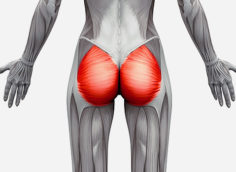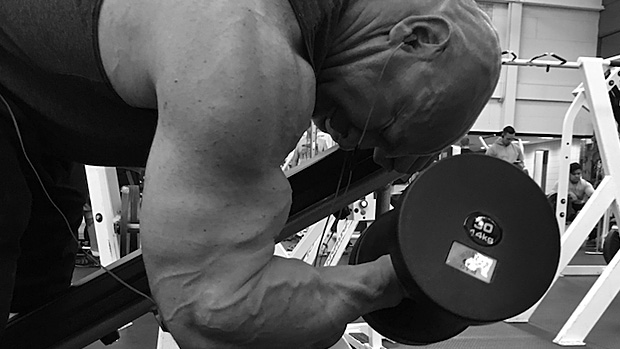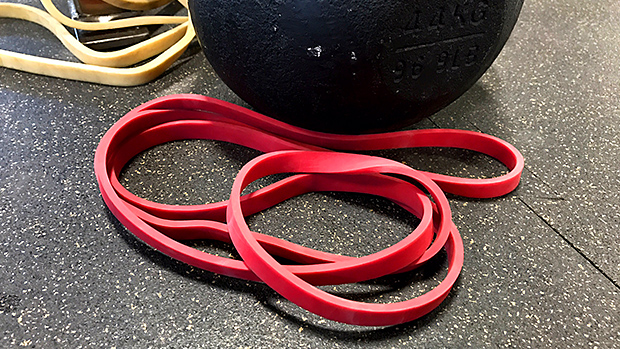The three of us Tim, Charles, and me were sitting around the office at the end of the day brainstorming well, not really brainstorming. The truth is, we were all taking turns on one of those wooden Bolo paddles with the ball attached by a rubber string; you know, the kind where you slap the ball into the air with the paddle and the string pulls it back? Well, Tim had gotten 163 in a row and my best effort had produced a heroic 85. Charles, however, was doing his best to hit the ball just once. In his frustration, he began swinging at the ball wildly, taking out a few lamps, a copier, and Tim's rare collection of porcelain poodles in the process.
The only way to make him stop was to start talking about training. It worked. It was like playing the violin to Frankenstein's monster. He put the Bolo paddle down and we started talking about neural drive and muscle fiber make-up and all the other stuff that makes the big fella's heart sing.
But right in the middle of our discussion, it occurred to us that our website didn't really contain any workouts. I mean, if you, the loyal reader, just wanted to log on and pull out a new workout, you couldn't do it. You'd probably have to resort to pulling out a copy of Ironman or something (shudder).
With that in mind, we went through the pile of workouts that Charles has written up in the last few years and decided to include them on our site. Hence this once-in-awhile column.
This particular one's a chest and back workout. We'll simply describe the exercises, sets, reps, etc., but we won't necessarily go into all the reasons why this particular exercise should be done in this particular way. Hell, we want to give you a new workout; not lull you to sleep.
Chest and Back Workout
| Exercise | Sets | Reps | Tempo | Rest | |
|---|---|---|---|---|---|
| A1. | Pull-Ups | 3 | 1 | 30-0-30 | 2 min. |
| A2. | Chest Dips | 3 | 1 | 30-0-30 | 2 min. |
| B1. | Mid-Grip Bench Press | 3 | 10-12 | 311 | |
| B2. | Flat Flyes | 3 | 10-12 | 101 | 2 min. |
| C1. | Wide-Grip Pulldowns (to the front) | 3 | 10-12 | 302 | |
| C2. | Wide-Grip Pulldowns (behind the neck) | 3 | 15-20 | 101 | 1 min. |
| D. | High Pulley Rows (to the neck) | 3 | 10-12 | 101 | 1 min. |
A few words about the movements:
Pull-ups and Chest Dips
Okay, nothing too tricky here (well, maybe a little tricky, but we'll get to that in a minute). Take a shoulder-width grip with your palms facing away from you. Now, if looked at the above workout and you're an eagle eye, you noticed that you're only supposed to do one rep. Easy, huh? Not so fast, lat-breath. Yes, you'll do one rep, but the tempo on this one rep is 30-0-30. That means you're to take a full 30 seconds to pull yourself up, and without pausing, take a full 30 seconds to lower yourself.
Now, you may not be able to do this it's really hard. If you can't, use a 15-0-15 tempo and work up, adding a couple of seconds each workout until you hit 30.
After your first set of pull-ups, lie on the floor and gasp for air for 2 minutes. At that point, go over to the dip rack and do your first set of dips. Make sure you keep your elbows out on this movement in this case, we're using the dip rack as a chest movement and not a triceps movement.
Again, take a full 30 seconds to lift yourself and a full 30 seconds to lower yourself, making sure you dip all the way down, Charlie. There'll be no goldbricks in this outfit. If 30 seconds is too rough, start with a 20-0-20 tempo and work your way up.
Rest 2 minutes and then go back to the second set of your pull-ups. Continue bouncing back and forth between your A1 and A2 movement until you've done three sets of each.
Barbell Bench Presses and Flat Flyes
Most of you won't like the idea of doing barbell bench presses when you're chest is already incredibly fatigued from the first chest movement, but that's the breaks. This is a fairly standard bench press movement here, but we'd like you to keep a shoulder-width grip instead of a wide, I'm-getting-ready-to-flap-my-arms-and-fly-like-a-birdie grip. The wide grip would allow you to lift a little more weight here, but don't worry; you'll already have to use so much less weight than you normally would that you'll be hopelessly embarrassed anyhow.
(In fact, it was at this point in TC's workout that Charles used his now-famous insult: "You are the only person I know who's IQ is higher than his bench press.")
Take three seconds to lower the weight, a one-second pause at the bottom of the movement, followed by a one-second raising of the weight.
Do 10-12 reps, and then, without resting, do 10-12 reps of a flat-bench flye. However, instead of using your conventional grip on the flyes, turn your thumbs (and the dumbbells) in. Keep them that way for the duration of the movement. (That's the way you should do flyes most of the time, anyhow.)
Rest 2 minutes, and then go back and embarrass yourself further on the bench press. Continue bouncing back and forth between B1 and B2 until you've done three sets of each.
Wide-Grip Front Pulldowns and Wide-Grip Behind the Neck Pulldowns
These are fairly conventional, but given that so many people use horrible, potentially damaging form on pulldowns, they probably should never be referred to as "conventional." In any event, take a wide grip on a parallel grip pulldown bar (the kind that has the handles built into it so that you can grab it with your palms facing each other). While maintaining a slight arch in your back, pull the bar to the top of your chest. Don't sway, don't lurch, and don't invoke the Lord's name in vane. Take two seconds to pull the weight down, no pause, and three seconds to guide the bar to the starting position. Do 10-12 reps.
Then, without resting, adjust the weight as necessary and begin doing wide, parallel grip, behind the neck pulldowns. Make sure you've scooted up on the seat as far forward as possible so that when you pull the bar down, you're pulling it straight down. This movement can be an orthopedic nightmare if you have to pull the bar down at an extreme angle.
Take one second to pull the weight down, no rest, and one second to guide the bar up. Make sure the bar touches the trapezius on each rep. Do 15-20 reps.
Then, after resting for only 1 minutes, go back to the second set of the wide, parallel grip, front pulldowns.
Continue bouncing back and forth between C1 and C2 until you've done three sets of each.
High Pulley Rows to the Neck
This movement probably isn't familiar to a lot of you. And, if you're like the average trainee, you won't be able to use much weight. Unfortunately, most people have pathetically weak rhomboids and mid-traps. Okay, so they're not a prestige muscle. Very few IFBB judges or bodybuilding mag cub reporters ever said, "Man, look at Flex's rhomboids!" However, these muscles provide a lot of thickness to the back, as well as giving a lot of assistance to bench press movements. Strengthen them and your bench press will go up.
Here's how to do 'em: attach a rope to a long-pulley row. Pretend that you're going to do conventional long-pulley rows (keeping the back slightly arched, the chest and head up). Now, grab the ends of the rope as if you were holding dual hammers. Now, while keeping your arms high in the same plane as the tops of your shoulders pull back with your elbows until they won't go any further back and squeeze. In other words, the movement looks just like a regular long-pulley row, except that you're using a rope and your arms are much higher than they would be in a conventional long-pulley row.
Do 8-10 reps, using a 3-2-1 tempo (three seconds to pull the weight back, two seconds to squeeze the elbows back, and one second to return the weight to the starting position). Rest 1 minutes and do the next set.
If you're like the average trainee, you'll only be able to use about 50 pounds on this movement. Amazing, huh? Don't worry, it'll go up fast, as will your bench press.
Conclusion
This workout might not seem like much, but you'll definitely be cursing us the day after. Again, we chose not to go into the specifics behind each movement. Suffice it to say that there's some rhyme or reason behind every exercise, every rep scheme, every grip, and every tempo and rest period.
Hopefully, this workout the first of many to follow will help you get out of a rut and make you excited about going to the gym today.





